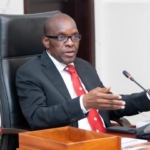
Speaker of Parliament Alban Bagbin has issued a clarion call for united action among all branches of government to champion the success of the government’s ambitious 24-hour economy initiative.
Speaking at a recent post-budget workshop held in Accra on Saturday, November 15, Mr Bagbin emphasised that the responsibility for this transformative initiative cannot rest solely on the shoulders of the executive branch and must encompass all sectors of governance, including the judiciary and the audit service.
Addressing legislators, The Speaker of Parliament articulated the crucial need for collaboration in this national endeavour.
“I want to raise this publicly that the pillars that can let us achieve this are not just only in the executive but also in the legislature, the judiciary, and, more importantly, the audit service. A word to the wise is enough,” he stated.
His remarks underscore the gravity of the situation, emphasising that the successful implementation of a 24-hour economy requires a multi-faceted approach that includes proper oversight, legal frameworks, and steadfast governance.
Mr Bagbin elaborated that while infrastructure plays a significant role in enabling a 24-hour economy, it is insufficient on its own.
He stressed the importance of establishing a robust legal framework and ensuring effective governance to create a conducive environment for this initiative to flourish.
“The initiative we are discussing cannot thrive on infrastructure alone. We need the supporting structures of good governance and a solid legal grounding,” he asserted.
The speaker’s comments are timely, as Ghana strives to enhance its economic output and manage rising unemployment, which currently hovers around 6.8%.
The 24-hour economy initiative aims to capitalize on resources and productivity by enabling businesses to operate around the clock, creating jobs and stimulating growth in key sectors including manufacturing, tourism, and services.
To put this initiative into action, various government bodies must collaborate effectively. From regulatory agencies ensuring compliance and fairness in the market to the judiciary enforcing the laws that govern business operations, every arm of government has a critical role to play.
The audit service, in particular, can provide essential oversight to ensure that resources are used efficiently and transparently.
Current measures indicate the government is already allocating resources towards improving infrastructure, with $1 billion earmarked for development projects in 2025 alone.
However, without the necessary legal frameworks and governance models, these investments may not yield the desired outcomes.
As the government moves forward with this initiative, it is essential for stakeholders from various sectors, including private enterprises and civil society, to join forces.
Public-private partnerships could significantly enhance the effectiveness of a 24-hour economy by combining resources and expertise in service delivery, technology, and community engagement.

